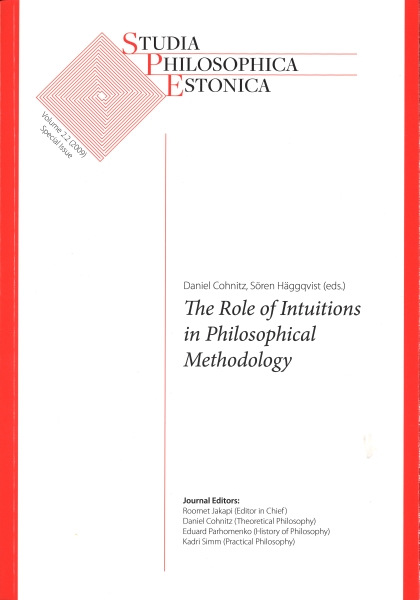Ideal Language Philosophy and Experiments on Intuitions
DOI:
https://doi.org/10.12697/spe.2009.2.2.07Keywords:
experimental philosophy, explication, intuition, linguistic philosophy, ordinary language philosophy, ideal language philosophy, metaphilosophyAbstract
Proponents of linguistic philosophy hold that all non-empirical philosophical problems can be solved by either analyzing ordinary language or developing an ideal one. I review the debates on linguistic philosophy and between ordinary and ideal language philosophy. Using arguments from these debates, I argue that the results of experimental philosophy on intuitions support linguistic philosophy. Within linguistic philosophy, these experimental results support and complement ideal language philosophy. I argue further that some of the critiques of experimental philosophy are in fact defenses of ideal language philosophy. Finally, I show how much of the current debate about experimental philosophy is anticipated in the debates about and within linguistic philosophy. Specifically, arguments by ideal language philosophers support experimental philosophy.
Downloads
References
Bergmann, G. (1949). Two criteria for an ideal language, Philosophy of Science 16(1): 71-74.
Bohnert, H. G. (1963). Carnap’s theory of definition and analyticity, in P. A. Schilpp (ed.), The Philosophy of Rudolf Carnap, Vol. 11 of The Library of Living Philosophers, Open Court Publishing Company, Chicago and LaSalle, Illinois, pp. 407-430.
Carnap, R. (1948). Introduction to Semantics, Vol. 1 of Studies in Semantics, Harvard University Press, Cambridge, Massachusetts.
Carnap, R. (1955). Meaning and synonymy in natural languages, Philosophical Studies 6: 33-47.
Carnap, R. (1962). Logical Foundations of Probability, 2nd edn, University of Chicago Press, Chicago.
Carnap, R. (1963). Replies and systematic expositions, in P. A. Schilpp (ed.), The Philosopy of Rudolf Carnap, Vol. 11 of The Library of Living Philosophers, Open Court Publishing Company, Chicago and LaSalle, Illinois, pp. 859-1016.
Carnap, R. (1967a). The Logical Structure of the World. Pseudoproblems of Philosophy., University of California Press, Berkeley and Los Angeles. Transl. of (Carnap 1998) by Rolf A. George.
Carnap, R. (1967b). The Logical Syntax of Language, Routledge & Kegan Paul Ltd, London. Reprinted with corrections. Transl. by Amethe Smeaton (Countess von Zeppelin).
Carnap, R. (1998). Der logische Aufbau der Welt, Vol. 514 of Philosophische Bibliothek, 3rd edn, Felix Meiner, Hamburg. [192 1961].
Feigl, H. (1958). Critique of intuition according to scientific empiricism, Philosophy East and West 8(1/2): 1-16.
Hare, R. M. (1960). Philosophical discoveries, Mind 69: 145-162.
Hare, R. M. (1975). Abortion and the golden rule, Philosophy and Public Affairs 4(3): 201-222.
Hempel, C. (1952). Fundamentals of Concept Formation in Empirical Sciences, Vol. 2 of Foundations of the Unity of Science. Toward an International Encyclopedia of Unified Science, University of Chicago Press, Chicago/London. Page numbers refer to the two-volume edition.
Hintikka, J. (1999). The emperor’s new intutions, The Journal of Philosophy 96: 127-147.
Kauppinen, A. (2007). The rise and fall of experimental philosophy, Philosophical Explorations 10(2): 95-118.
Knobe, J. (2007). Experimental philosophy and philosophical significance, Philosophical Explorations 10(2): 119-121.
Kuipers, T. A. F. (2007). Introduction. Explication in philosophy of science, in T. A. Kuipers (ed.), General Philosophy of Science–Focal Issues, Vol. 1 of Handbook of the Philosophy of Science, North Holland, Amsterdam, pp. vii-xxiii.
Liao, S.M. (2008). A defense of intuitions, Philosophical Studies 140(2):247-262.
Mates, B. (1958). On the verification of statements about ordinary language, Inquiry 1: 161-171.
Maxwell, G. and Feigl, H. (1961). Why ordinary language needs reforming, The Journal of Philosophy 58(18): 488-498.
Nadelhoffer, T. and Nahmias, E. (2007). The past and future of experimental philosophy, Philosophical Explorations 10(2): 124-149.
Naess, A. (1938). “Truth” as Conceived by those who are not Professional Philosophers, number 4 in Skrifter Norske Videnskaps-Akademi, Oslo, II. Hist.-Filos. Klass 193 Jacob Dybwad, Oslo.
Naess, A. (1953). Interpretation and Preciseness: A Contribution to the Theory of Communication, number 1 in Skrifter Norske Videnskaps-Akademi, Oslo, II. Hist.-Filos. Klass 195 Jacob Dybwad, Oslo.
Neurath, O. (1932). Protokollsätze, Erkenntnis 3(1): 204-214.
Popper, K. R. (1963). The demarcation between science and metaphysics, in P. A. Schilpp (ed.), The Philosopy of Rudolf Carnap, Vol. 11 of The Library of Living Philosophers, Open Court Publishing Company, Chicago and LaSalle, Illinois, pp. 183-226.
Richardson, A. (2007). “That sort of every day image of logical positivism” – Thomas Kuhn and the decline of logical empiricist philosophy of science, in A.Richardson and T. Uebel (eds), The Cambridge Companion to Logical Empiricism, Cambridge University Press, Cambridge, pp. 346-370.
Rorty, R. (1967a). Introduction. Metaphilosophical difficulties of linguistic philosophy, in R. Rorty (ed.), The Linguistic Turn: Essays in Philosophical Method, University of Chicago Press, pp. 1-39.
Rorty, R. (ed.) (1967b). The Linguistic Turn. Recent Essays in Philosophical Method,The University of Chicago Press, Chicago and London.
Sosa, E. (2007). Experimental philosophy and philosophical intuition, Philosophical Studies 132(1): 99-107.
Strawson, P. F. (1963). Carnap’s views on constructed systems versus natural languages in analytic philosophy, in P. A. Schilpp (ed.), The Philosophy of Rudolf Carnap, Vol. 11 of The Library of Living Philosophers, Open Court Publishing Company, Chicago and LaSalle, Illinois, pp. 503-518.
Symons, J. (2008). Intuition and philosophical methodology, Axiomathes 18(1): 67-89.
Williamson, T. (2007). The Philosophy of Philosophy, Vol. 2 of The Blackwell/Brown Lectures in Philosophy, Blackwell Publishing.

